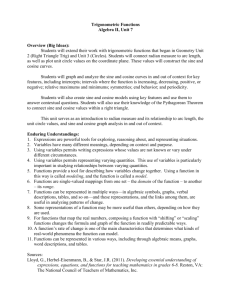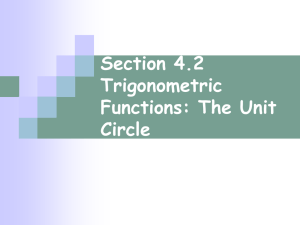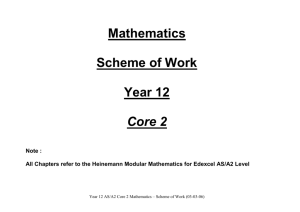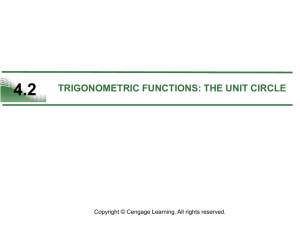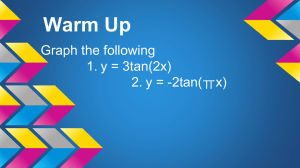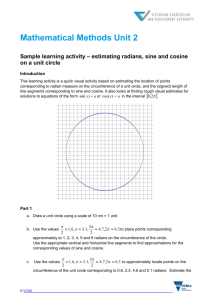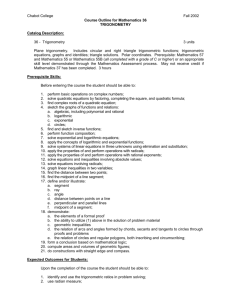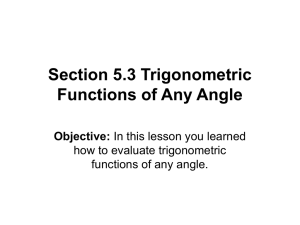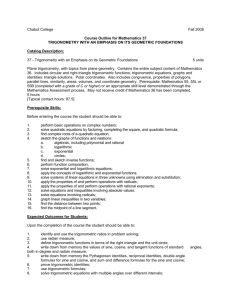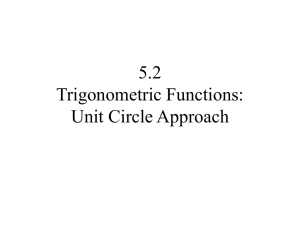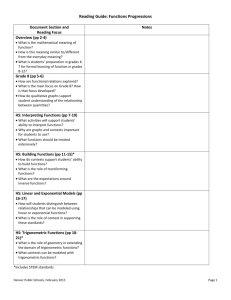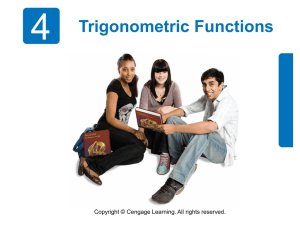02 Algebra II Unit 7 Starting Points
advertisement
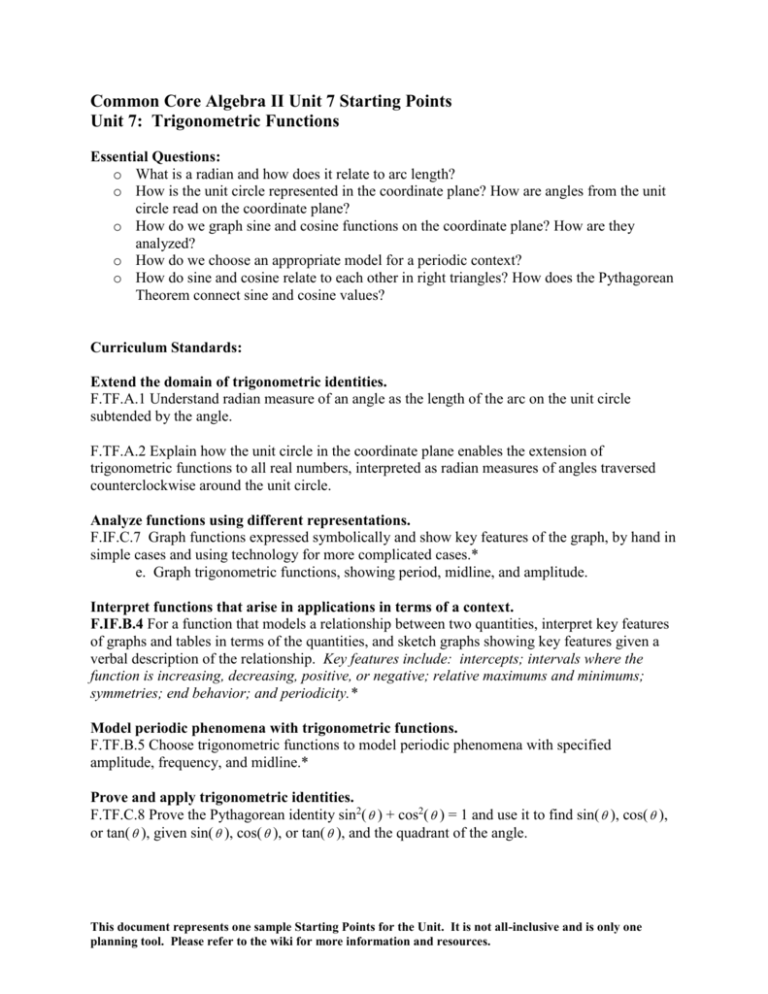
Common Core Algebra II Unit 7 Starting Points Unit 7: Trigonometric Functions Essential Questions: o What is a radian and how does it relate to arc length? o How is the unit circle represented in the coordinate plane? How are angles from the unit circle read on the coordinate plane? o How do we graph sine and cosine functions on the coordinate plane? How are they analyzed? o How do we choose an appropriate model for a periodic context? o How do sine and cosine relate to each other in right triangles? How does the Pythagorean Theorem connect sine and cosine values? Curriculum Standards: Extend the domain of trigonometric identities. F.TF.A.1 Understand radian measure of an angle as the length of the arc on the unit circle subtended by the angle. F.TF.A.2 Explain how the unit circle in the coordinate plane enables the extension of trigonometric functions to all real numbers, interpreted as radian measures of angles traversed counterclockwise around the unit circle. Analyze functions using different representations. F.IF.C.7 Graph functions expressed symbolically and show key features of the graph, by hand in simple cases and using technology for more complicated cases.* e. Graph trigonometric functions, showing period, midline, and amplitude. Interpret functions that arise in applications in terms of a context. F.IF.B.4 For a function that models a relationship between two quantities, interpret key features of graphs and tables in terms of the quantities, and sketch graphs showing key features given a verbal description of the relationship. Key features include: intercepts; intervals where the function is increasing, decreasing, positive, or negative; relative maximums and minimums; symmetries; end behavior; and periodicity.* Model periodic phenomena with trigonometric functions. F.TF.B.5 Choose trigonometric functions to model periodic phenomena with specified amplitude, frequency, and midline.* Prove and apply trigonometric identities. F.TF.C.8 Prove the Pythagorean identity sin2( ) + cos2( ) = 1 and use it to find sin( ), cos( ), or tan( ), given sin( ), cos( ), or tan( ), and the quadrant of the angle. This document represents one sample Starting Points for the Unit. It is not all-inclusive and is only one planning tool. Please refer to the wiki for more information and resources. Approximate Length of Unit: 15-18 days Standard(s) F.TF.A.1 Days 1-2 Notes Big Ideas: Use radian measure to find arc length and angle location on the coordinate plane. (Pre-Assess student understanding of radian measure. This was introduced in Unit 3 (Circles) in Geometry.) Resources: Lesson Seed: Radian Measures of Angles and Arcs Assessment Items: Illustrative Mathematics: Bicycle Wheel Illustrative Mathematics: What exactly is a Radian? F.TF.A.2 2 Big Ideas: Identify cosine, sine, and tangent values on the unit circle. Graph the sine and cosine values from the unit circle on the coordinate plane, including values beyond 2 radians or 360 degrees. Resources: to Larger Lesson: Extending Trig Functions Angles Assessment Items: Illustrative Mathematics: Trigonometric Identities and Rigid Motions Illustrative Mathematics: Properties of Trigonometric Functions Illustrative Mathematics: Trigonometric Functions for Arbitrary Angles Illustrative Mathematics: Trig Functions and the Unit Circle F.IF.C.7e 4-5 Big Ideas: Graph simple sine and cosine curves by hand. Graph complicated sine and cosine curves using technology. This document represents one sample Starting Points for the Unit. It is not all-inclusive and is only one planning tool. Please refer to the wiki for more information and resources. Analyze models and graphs for key features and respond to questions. Resources: Lesson: Basic Trigonometric Graphs Lesson: Altering Trig Graphs F.IF.B.4 Big Ideas: Graph and analyze sine and cosine functions in context. 3-4 Use technology to identify key features. Resources: Lesson: Modeling with Trig Functions Lesson Seed: Phase Shift Assessment Items: Illustrative Mathematics: Exploring Sinusoidal Functions F.TF.B.5 Big Ideas: Create appropriate sine and cosine models for realworld contexts and respond to questions. 3 Find key features by hand for simple cases; use unit circle values when necessary to simplify equations. Use technology to simplify complicated equations. Resources: Task: Round and Round We Go F.TF.C.8 Big Ideas: Verify sin 2 cos 2 1 throughout different types of problems, including given an angle, given sides of a triangle, given a diagram. 1-2 Resources: Lesson Seed: Trig Identity Lesson: Prove Pythagorean Identity Assessment Items: Illustrative Mathematics: Trigonometric Ratios and the Pythagorean Theorem This document represents one sample Starting Points for the Unit. It is not all-inclusive and is only one planning tool. Please refer to the wiki for more information and resources. Illustrative Mathematics: Finding Trig Values Illustrative Mathematics: Calculations with Sine and Cosine Howard County Public Schools Office of Secondary Mathematics Curricular Projects has licensed this product under a Creative Commons Attribution-NonCommercial-NoDerivs 3.0 Unported License. This document represents one sample Starting Points for the Unit. It is not all-inclusive and is only one planning tool. Please refer to the wiki for more information and resources.
